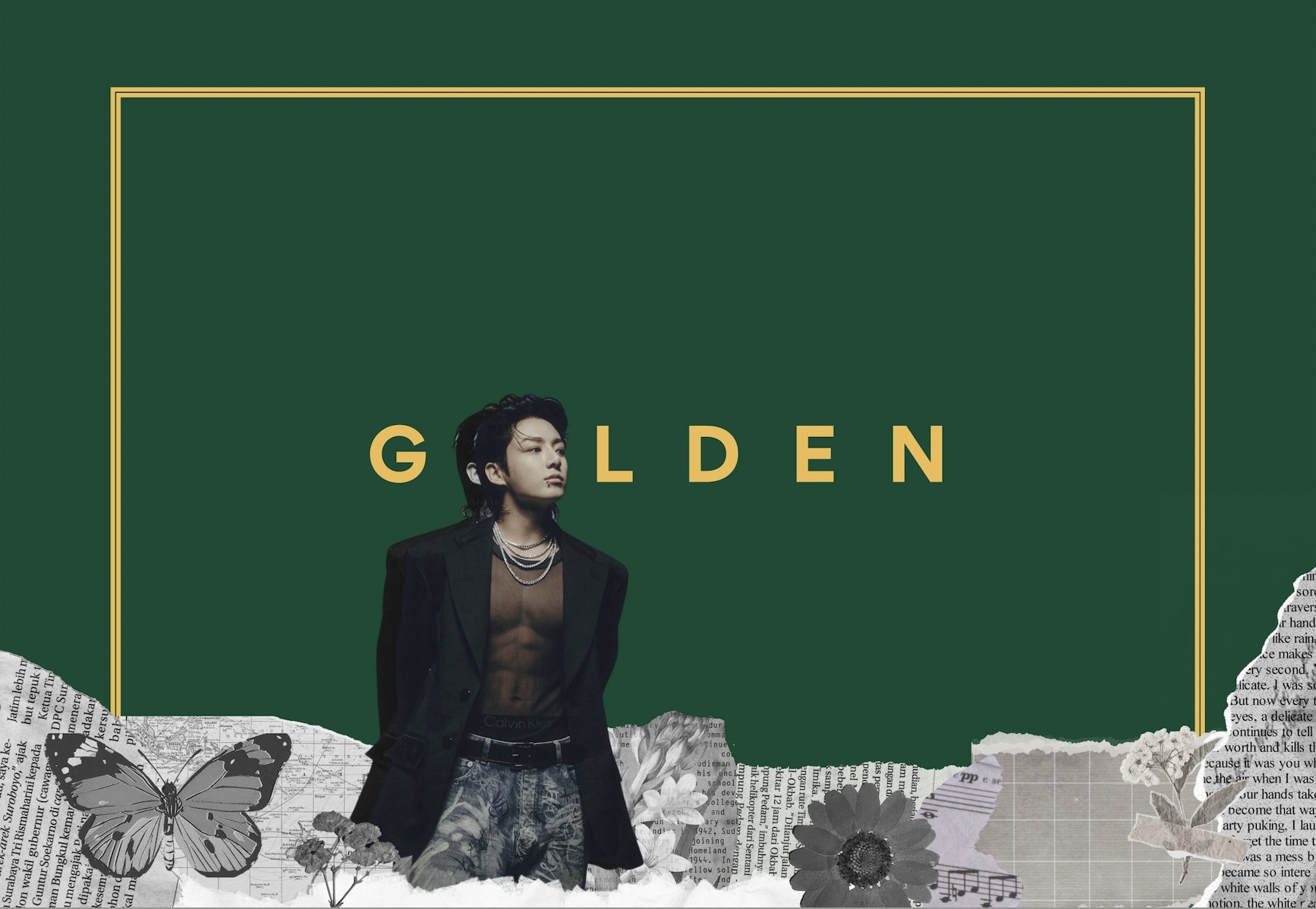As the K-pop world continues to gain mainstream popularity in American media, fans old and new are paying close attention to the internationally acclaimed South Korean boy band BTS. While the septet is currently on hiatus with three of its members in military service, the remaining members have begun to pursue solo projects. Following in the footsteps of fellow members RM (“Indigo”), Jimin (“FACE”) and J-Hope (“Jack in the Box”), Jungkook made his solo debut with the release of his highly anticipated album “Golden” on Nov. 3.
Drawing from BTS’ distinctive “bangtan style” blend of vocal/rap lines and American pop music, “Golden” is entirely in English and features Western artists Jack Harlow, Latto, Major Lazer, and DJ Snake. Though the album is an obvious attempt to appeal to the Western market, it includes artists who, quite frankly, wouldn’t be expected to appear alongside a K-pop idol. These collaborations are becoming increasingly popular among American and international audiences, and in “Golden,” they complement Jungkook’s style well.
As someone who thoroughly enjoyed “Seven,” an R&B pop song previously released as a single this July featuring American rapper Latto, I had high hopes for the rest of the album. Jungkook did not disappoint. While the album wasn’t particularly groundbreaking in genre or style, I would consider it a strong debut for Jungkook’s solo career.
The album’s opener “3D” was perhaps my favorite song, with a catchy beat, chorus and attention-grabbing, albeit somewhat cheesy, first verse. A minimalist pop R&B track featuring Jack Harlow, “3D” showcased Jungkook’s vocals in a way that hints at a signature sound and style, something only recently introduced with the rise of BTS members’ solo projects. The song tells the familiar story of unrequited attraction toward someone just out of reach, but with a twist. “3D” effectively sets the tone for the rest of the album with an expectation for fast-paced, upbeat and feel-good music.
Another standout is the album’s title track, “Standing Next to You,” which sets itself apart with a distinctive beat and electrifying brass instrumental. The song lends itself to a smooth disco-pop-style track that highlights Jungkook’s dulcet falsetto.
When played in sequential order, songs like “Yes or No,” “Please Don’t Change” and “Somebody” tend to blend together. However, these tunes complement the rest of the album. While not memorable, they contribute to the collective energy of “Golden”. One aspect of the album I enjoyed was the fact that you don’t really have to be in any sort of mood to listen to “Golden.” Now, this could be an advantage or a disadvantage to the album, as it doesn’t seem to draw on any particularly strong emotions. This may be due to the fact that the album’s 11 tracks were written by a team of songwriters employed by Jungkook’s label HYBE. Without Jungkook writing the lyrics, it’s not surprising that many of the tracks lack a distinguishing personality. Instead many of the songs in the middle of the album share a sort of factory cookie-cutter feel. Still, there are exceptions within the album. By the end of “Golden,” listeners are given a stronger taste of Jungkook’s distinct voice and style.
The album’s closing track, “Shot Glass of Tears,” takes a turn into melancholia. Even with songs “Hate You,” “Somebody” and “Too Sad to Dance” signaling a gradual shift in the album’s mood from misunderstanding to despair, it isn’t until “Shot Glass of Tears” that listeners experience genuine emotion coming through Jungkook’s voice. Time slows for listeners as this ballad sews together a story of breakup, grief, and recovery through soft, melodic vocals and crescendos. As he sings, “Got a shot glass full of tears / Drink, drink, drink, say, ‘Cheers’ / I got all these diamonds running / down my face,” listeners get a sense of the heartbreak the singer is dealing with.
Although it may not be the most innovative of debuts, “Golden” is a strong start for Jungkook’s solo career. Its catchy lyrics, blended rhythmic styles and radio appeal make its songs worthwhile and captivating. More than its general pleasantness, the album’s success in the American music market is a continuation of the mainstream acceptance of Asian pop music and artists — an important milestone for Asians in the music industry. “Golden” hit No. 1 on Billboard’s Top Album Sales Chart, selling 164,000 copies in the first week of its release.
With such international appeal, “Golden” is yet another story of success for Asian media in the West. For me, the prominence of K-pop and BTS in mainstream music is something I’m excited to see more of in the future, especially with more of the genre’s music being released in English.
Graphic Credit: Sydney Gaw

Comments are closed.